
18 minute read
4.0 CLIMATE INNOVATION FUND
In 2019 SDCC approved a budget to provide seed funding for innovative projects that can demonstrate alignment with actions or objectives in the CCAP. This Climate innovation Fund is available to all staff in SDCC who hope to pilot or progress innovative projects with the potential to reduce energy consumption or greenhouse gas emissions, conduct feasibility studies to improve current practices, inform the citizens of South Dublin on climate action or develop pilot or exemplar projects to demonstrate and support our policies and guidance documents. Since 2019, the Climate Innovation Fund has received an annual allocation to encourage innovative solutions to climate change. In 2022, Funding was allocated to the following projects categorised under the 4 key objectives of the CCAP.
4.1 IMPROVE ENERGY EFFICIENCY
Advertisement
4.1.1 ENERGY ELEPHANT
SDCC’s Climate Innovation fund provided funding of €14,760.00 to continue the pilot project in 2022.
4.1.2 GREENING TALLAGHT STADIUM
Tallaght Stadium is owned and operated by SDCC and is best known for being both home to Ireland’s most successful football club Shamrock Rovers and equally as the home grounds of the Football Association of Ireland women’s national team.
A multipurpose venue, the stadium has played host to a variety of other sports including rugby, American football, hurling and Gaelic football. Tallaght Stadium is a UEFA Category 4 venue, a standard that puts it alongside some of the world’s most elite stadia.
The stadium also offers conference facilities for up to 300 delegates and a concert facility for up to 20,000 patrons. Construction of a new 4th stand began in 2022 which will increase the seated capacity from 8,000 to 10,000.
As part of our commitment to climate action, SDCC has sought quotations to carry out a feasibility study to improve Tallaght Stadium’s climate friendly profile, establishing a baseline and identifying a register of opportunities in key areas of Energy, Waste and Water.
Energy Elephant were awarded a 2-year contract as a pilot project with SDCC to install a full energy monitoring and management system for the council. The cloud-based energy data management solution aims to assists SDCC in a number of areas-
• In efficiently managing and reducing ongoing energy use, carbon emissions and utility costs for our buildings, assets, public lighting, and vehicles.
• By providing a strategic real-time overview of energy use and costs, will promote internal user engagement facilitating the roll-out and implementation of ISO 50001. The solution is able to manage both billing data from invoices, and interval data from smart metering. The system is central to SDCC in meeting EU 2030 Carbon-reduction targets and overall Climate-change Strategy actions.
• In building a comprehensive searchable energy database, recording energy initiatives and verifying energy savings, it delivers an evidence base and benchmark for investment decisions on building upgrade and renewable-energy programmes into the future.
The study will also examine/review the current environmental performance of Tallaght Stadium and present recommendations based on current best practice climate action for stadia.
The study will include:
Stadium Information
A brief description of the stadium, with calculations of annual CO2e emissions.
Analysis of Performance and Register of Opportunities
Energy
• Aligning with the requirements and methods detailed in the European Union Regulations
• Establish baseline data of total annual energy usage for the years 2017- 19 Provide an analysis of the
Significant Energy Users at the stadium.
• Include a list of potential energy efficiency/CO2e reduction measures
• Analysis of the measures to include indicative costs and potential savings.
Waste
• Aligning with national policy on the circular economy the study should:
• Establish baseline data for the years 2017-2019 of total annual tonnages of waste and the cost of disposal.
• Breakdown to be provided on individual waste streams.
• Identify innovative and best practice solutions to reducing waste at stadium events including circular economy aligned solutions.
Water
• Establish a baseline of water usage in Tallaght Stadium.
• Provide an analysis of the significant water users at the stadium.
• Include a list of potential Sustainable Drainage Systems (SuDS), and water conservation measures suitable for the stadium.
Additional Considerations:
Other innovative opportunities to position Tallaght Stadium as a world class climate friendly venue should be examined.
Green Procurement
SDCC is committed to Green Public Procurement (GPP), sourcing goods, services and works with a reduced environmental impact. Tenderers have been asked to demonstrate how they are working to reduce the environmental impact of the delivery of this service.
Suppliers will demonstrate the relevant educational and professional qualifications staff have been awarded.
Suppliers are also asked to provide information on steps they have taken in examining the climate and environmental performance of their organisation i.e., professional accreditation achieved.
SDCC’s Climate innovation fund has approved €25,000 for the development of a feasibility study to review sustainable solutions to grass management.
4.2 REDUCE CARBON EMISSIONS
4.2.1 DUBLIN REGIONAL ELECTRIC VEHICLE CHARGING STRATEGY
The Dublin Regional Electric Vehicle Charging Infrastructure Strategy was launched on Monday 13th June 2022. The strategy outlines the expected need for EV charging infrastructure in the Dublin Region to support the anticipated increase in electric vehicles in the region. The objective of this strategy was to assess what infrastructure should be deployed and where, the number of charging points needed, the level of investment that will be required over the next 10 years, and to explore the coordinated role the Dublin Local Authorities (DLAs) play in the infrastructure roll out.
The report also includes a stakeholder engagement study that helps identify potential obstacles to the deployment of chargers, identifying available grid capacity as one of the main challenges. The report makes recommendations, including the continued engagement with stakeholders including ESB networks.
The strategy identifies the potential requirement for over 1,600 public charge points in the Dublin Region by 2025, categorised as mainly Residential and Destination EV charging. The DLAs are working to identify suitable locations to meet this need. The role of the DLAs will be to facilitate the roll out of Rapid Hubs and on-street equipment through planning and licensing, and to ensure that our public sites, including sports centres, parks, and administration buildings, have public charging facilities, where possible.
SDCC Climate Innovation Fund Contributed €20,491.16 to the development the Dublin Local Authority Electric Vehicle Charging Strategy.
4.2.2 ELECTRIC BIKES FOR PARK RANGERS
SDCC introduced new electric bicycles for use by park rangers in Tymon and Corkagh Park. Funded by SDCC’s Climate Innovation Fund, the e-bikes are helping to transition our park rangers away from their traditional modes of transport.

These e-bikes are being used both for journeys within parks, and between parks, for example via South Dublin’s greenways. As such, the e-bikes are helping to reduce greenhouse gas emissions, one of the key targets in our Climate Change Action Plan, as well as improving air quality and reducing congestion on our roads. Additionally, the e-bikes provide the rangers with greater access and visibility of their parks as they can travel to locations inaccessible to vans, while minimising disruption to park users that the larger vehicles can cause. Our park rangers on their e-bikes are now more visible to citizens and more approachable. In this way, daily citizen interactions with climate action in South Dublin are also increasing. The initiative also supports wellbeing and good health by presenting our employees with an option to engage in active travel as an alternative to using fossil fuelled transport.
SDCC has committed to transitioning to a zero-carbon fleet. An assessment of work and duties allows us greater flexibility when assigning equipment to staff, saving on resources and costs. By matching the task with appropriate equipment, SDCC is taking action towards managing natural resources. The electric bicycles will help reduce SDCC’s Carbon Emissions associated with transport.
SDCC Climate Innovation Fund provided €6,900 to purchase the e-bikes and safety equipment.
4.2.3 ANAEROBIC DIGESTOR FEASIBILITY STUDY
SDCC manages over 1,500 hectares of parks and open spaces including 163 Ha of Pollinator friendly meadows and have been implementing a decreased mowing regime over the past number of years. Currently, approximately 4,000 tonnes of grass cutting are produced each year, the majority is used as fodder. SDCC are seeking innovative alternative solutions to managing the grass cuttings, including the possibility of anaerobic digestion (AD). SDCC are currently procuring a feasibility study to review/ examine sustainable solutions/options to managing grass cuttings including the following;
• SDCC allow grassland meadows to grow for pollinators and biodiversity purposes
• Currently 4,000 tonnes of grass cutting used as fodder
• Calculate and outline the greenhouse gas emissions for different options
• Quantify the monetary cost for different options
• Quantify potential to generate biofuels from grass cuttings
• Review options for biofuels produced (fleet, district heating….)
4.3 MAKE DUBLIN RESILIENT TO THE IMPACTS OF FUTURE CLIMATE CHANGE RELATED EVENTS
4.3.1 SUDS GUIDANCE
The negative aspects of traditional surface water drainage systems have been well documented. Traditional drainage practices rely on the conveyance ad acceleration of runoff (surface water) through pipes and bypassing the natural buffering effect of soils and vegetation.
Volumes and rates of runoff can increase significantly post development, and impermeable surfaces associated with urban development often become contaminated by a variety of pollutants, which can get carried and discharged by the runoff into receiving waters, causing pollution.
Sustainable drainage systems (SuDS) alleviate many of these issues by maintaining and restoring more natural hydrological regimes. They are designed to maximise the opportunities and benefits we can secure from surface water management.

SuDS solutions can take many forms, both above and below ground. SuDS that are designed to manage and use rainwater close to where it falls, on the surface, and incorporating vegetation, tend to provide the greatest benefits. Most SuDS schemes use a combination of SuDS components which forms a “SuDS management train” to achieve the overall design objectives for the site.
The 4 main objectives of Sustainable Drainage Systems (SuDS) are:
Water Quantity
• To manage runoff volumes and flow rates from hard surfaces, reducing the impact of urbanisation on flooding events
• Provide opportunities to use runoff where it falls
• Protect natural flow regimes in watercourses
• Provide opportunities for evapotranspiration from vegetation and surface water
• Encourage natural groundwater/aquifer recharge (where appropriate)
Water Quality
• Protect or enhance water quality (reducing pollution from runoff)
Biodiversity
• Support attractive habitats for wildlife in urban watercourses
Public Amenity
• Sympathetic to the environment and the needs of local communities
• Create better places to live, work and play
SDCC engaged McCloy Consulting to develop a SuDS Explanatory, Design and Evaluation Guide for the County, in accordance with international best practice and, the SDCC County Development plan objectives. It aligns with target action areas detailed in SDCC’s Climate Change Action Plan 2019-2024 relating to flood resilience and nature-based solutions.
SDCC SuDS guidance was launched on the 7th February 2022, and is available on SDCC website https://www. sdcc.ie/en/services/planning/planning-applications/ water-and-drainage-considerations/ https://www.sdcc.ie/en/services/environment/ environmental-health/water-services/sustainabledrainage-systems/sdcc-householders-guide-tosustainable-drainage-suds-.pdf
SuDS Taking in Charge details were issued to SDCC in August 2022.
A separate householders guide to SuDS was launched in May 2022 to provide a range of solutions to sustainably managing rainfall in domestic and community settings.
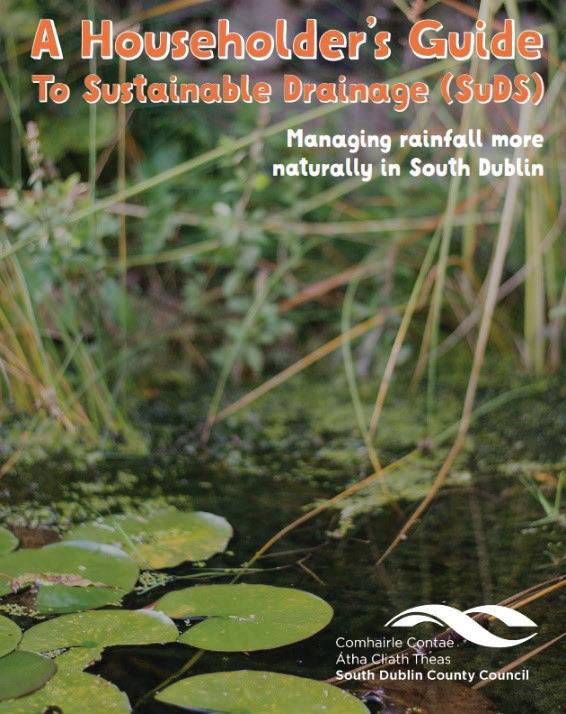
In conjunction with developing the suite of guidance documents, McCloy Consultants provided a series of SuDS training and workshops to relevant SDCC staff throughout March and April 2022 and to private sector stakeholders on 24th May 2022 with the aim of developing a shared understanding of SuDS and introducing how to incorporate them into future developments or projects.
SDCC’s Climate Innovation Fund contributed €25,000 towards the cost of developing the SuDS guidance documents.
4.3.2 GPS SURVEYING EQUIPMENT FOR SUDS PROJECTS

SDCC’s Water Services section requested funding support from the Climate Innovation Fund to purchase surveying equipment comprising of a GPS receiver and control module. This specialised equipment will be used by Water Services section (planning and capital) and the ongoing LIFE project to accurately locate and map water services assets including SuDS infrastructure, Integrated Constructed Wetlands (ICWs) infrastructure, natural water courses, culverts, manholes, sensitive green and blue infrastructure etc.
The equipment is currently being used to update infrastructure records and to manage and protect, water quality, for example providing significant benefit through mapping high-risk and sensitive locations. The equipment will also support important information to be used to inform decision making on future developments, and Local Area Action Plans. The GPS Surveying equipment has been made available for use by other sections of SDCC.
SDCC’s Climate Innovation Fund supported the purchase of equipment and training with €24,354.00
4.4 ACTIVELY ENGAGE AND INFORM OUR CITIZENS ON CLIMATE CHANGE
4.4.1 WECOUNT/I-CHANGE
The ’WeCount’/i-change’ project empowers citizens to measure road traffic and air pollution in their own neighbourhoods. ’WeCount’/i-change’ is a European citizen engagement project comprising case studies in 6 cities: Dublin, Cardiff, Barcelona, Madrid, Leuven, Ljubljana. Citizens and community groups within each city are provided with low-cost sensors that count the number of heavy vehicles, cars, bicycles, pedestrians and air pollution at the street level. Data collected will be used to provide evidence of the need for sustainable mobility policies around schools;, such as the 30km/h speed limit around schools, the School Zone initiative, etc.
For more information on this project please refer to https://we-count.net/networks/dublin
SDCC collaborated on the ‘WeCount/i-change’ project in 2022 with UCD, by funding the provision of air quality monitoring equipment to schools in the county to the value of €1,660.50, through the SDCC Climate Innovation Fund.
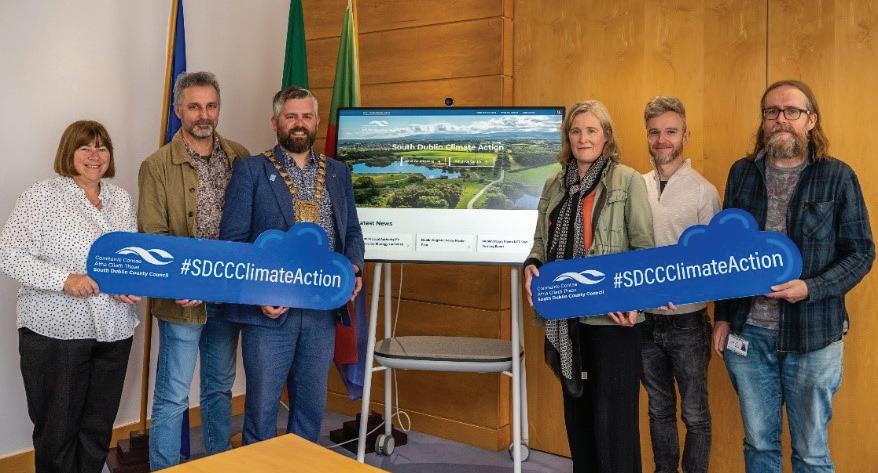
4.4.2 SDCC CLIMATE ACTION WEBSITE
The Climate Change Website www.southdublinclimate. ie was launched on 20th June. SDCC engaged P-Tools to develop the website, as a key objective of our Citizen Engagement team.
The Climate Innovation Fund supported the development of the website with funding to the value of €14,637.00. SDCC regularly update the website with climate action information and useful links for citizens.
4.4.3 NORTH CLONDALKIN BICYCLE HUB PROJECT
South Dublin County Sports Partnership (SDCSP) applied for funding from the Climate Innovation Fund to develop a Community Bike Hub in North Clondalkin. The hub provides bicycles, training and employment opportunities to disadvantaged and marginalised groups within the local community.
The project shares many of the key objectives of SDCC’s Climate Action Plan, including:
• Road safety training
• Education
• Reuse / upcycling equipment
• Promoting active travel
• Supporting and empowering communities
The first hub was developed at Collinstown Park Community School Clondalkin. By locating the Community Bike Hub on the grounds of an established school/community sport facility, SDCSP provides a centralised base to welcome and engage the vulnerable community while providing staff and support structure for the bike hubs
The socially conscious business model works to reinvest and provide a sustainable service to the communities and to build community wealth. A key objective is to directly improve the job skills of citizens facing barriers to joining the workplace.
The Community Sports Hub will provide training facilities to the hub. The hub is ideally located in a community facility that provides a wide range of additional social services such as tea/coffee facilities, community allotments and adult education programmes. The addition of the community Bike will complement and enhance the local community campus.
Both South Dublin County Sports Partnership and Cycling Ireland actively lead the provision of high-quality education and training programmes, services and support to young people and adults across the administrative area.
SDCSP actively delivers a school sports programme across South Dublin County. This programme is based in all primary and secondary schools and its aim is to engage young people in a wide range of sports. This programme also delivers teacher training to ensure the sustainability of the activity within the school.
The Clondalkin Bike hub is innovative as it is the first project of this type in Ireland, providing facilities and equipment, training and education, bicycle repair and recycling.
The North Clondalkin Bike Hub has demonstrated how it supports and promotes active travel initiatives and reuse of equipment and materials to provide innovative solutions to a broad range of socio-economic issues. SDCC was proud to support the project with €30,000 from the Climate Innovation Fund.
4.4.4 MINI WOODLANDS PROJECT IN MILL RACE LANE, PALMERSTOWN
SDCC Public Realm have established a number of mini woodland projects in conjunction with community volunteers including Stepping Stones Forests, the Pink Ladies and clients of Stewarts Hospital. In October 2022, 300m2 of native woodland was planted in Mill Lane Park, Palmerstown as part of a wider landscape and woodland restoration project being undertaken by Stewarts Hospital.
Site preparatory works commenced in June which included clearing and removing debris, laying cardboard and spreading mulch to enrich the soil. Community groups returned in October to commence planting the mini woodland.
As well as being important ecological features these projects are a great way of involving communities in positive Environmental Actions.
A similar Miyawaki Forest was completed in Sean Walsh Park in 2021. More information on this project can be found at: https://www.youtube.com/ watch?v=WTUdD2TdTlc .
SDCC’s Climate Innovation Fund supported the development of the Mini Woodland project and the production of supporting educational media and material with funding of €7,500.
4.4.5 BIODIVERSITY VIDEO Biodiversity Informational Video for Staff
The purpose of this video for SDCC staff is to highlight what exactly what we mean by biodiversity, who our pollinators are, what they do, and what can we do as SDCC to help them, driving awareness into SDCC’s daily work.
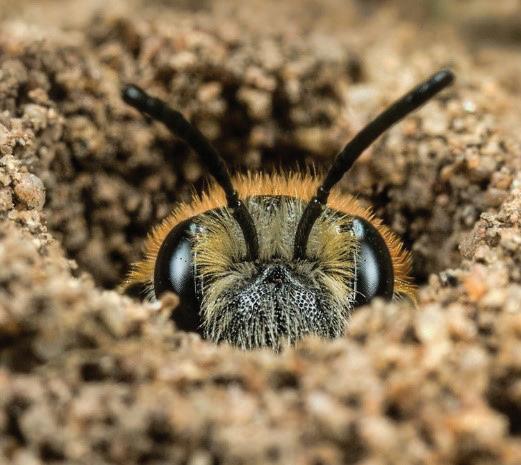
The video outlines background information on biodiversity and pollinators and the factors contributing to the decline of pollinators in Ireland. In particular, it outlines the different species of bees, their lifecycle, and how they contribute to pollination. The video describes the types of habitats needed by bees to survive and types of plants we can provide to help and encourage them.
The video presents SDCC’s efforts are to help pollinators linking this effort directly back to SDCC’s Pollinator Action Plan 2021-2025. It also highlights examples of works undertaken by SDCC every year with tree planting (including our new mini woodland strategy), bulb planting, and hedgerow maintenance programmes.
Biodiversity Informational Video for Communities
A Biodiversity Information video was produced for Communities within South Dublin. The purpose of this video is to highlight what exactly we mean by biodiversity, who our pollinators are, what they do, and what can the community do to help SDCC to protect and encourage pollinators.
The video provides background information on biodiversity and pollinators, highlighting the importance and the value that the various insect species have. It also outlines the factors that are causing pollinators to decline in Ireland, with an emphasis on why pesticides are bad for pollinators.
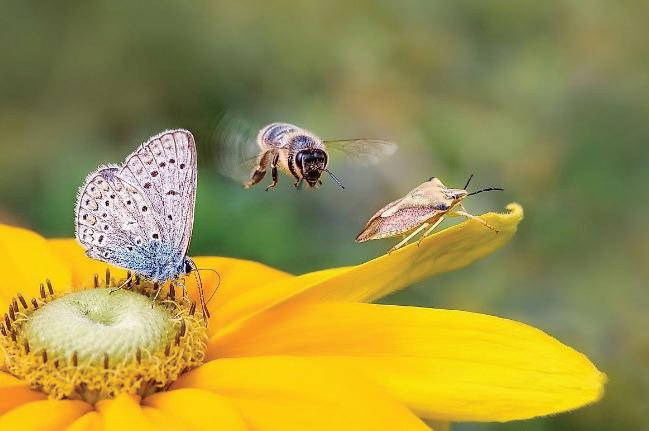
The video examines the different species of bees, their lifecycle, and how they contribute. What habitats that they need in order to survive and what plants we can provide to help and encourage them.
It provides an overview of SDCC’s Pollinator Action Plan 2021-2025, and SDCC’s actions including tree planting (along with our new mini woodland strategy), bulb planting, and hedgerow maintenance to support pollinators.
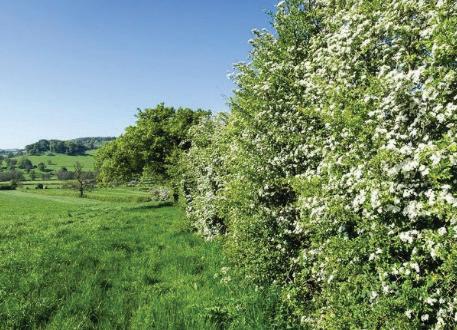

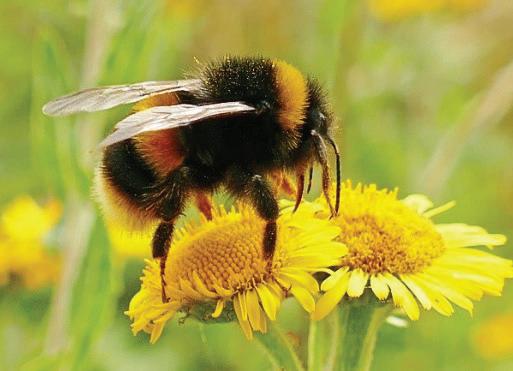

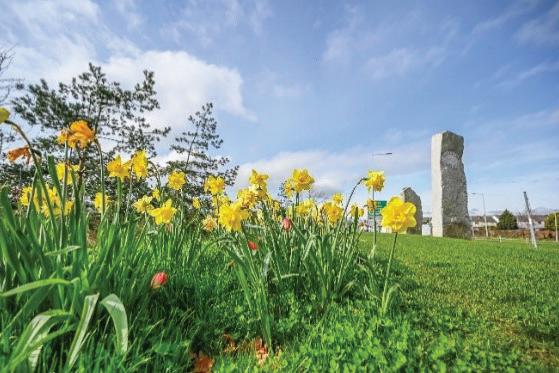
The presentation describes what communities can do to support biodiversity in their local areas and assist pollinators.
Finally, the video concludes with examples of pollinator friendly initiatives.
SDCC’s Climate innovation fund supported the production of the biodiversity videos with €4,875.00
4.4.6 DUBLIN CLIMATE ACTION WEEK #DCAW22
Dublin Climate Action Week took place from Monday 12th to Saturday 17th September 2022. Now in its second year, Dublin Climate Action Week was organised and delivered by the partnership of

• SDCC (who chaired the 2022 steering group),
• Dún Laoghaire-Rathdown County Council,
• Dublin City Council,
• Fingal County Council,
• Codema – Dublin’s Energy Agency,
• Dublin Climate Action Regional Office (CARO).
Together the partners aimed to shine a light on how the Dublin region is engaging with climate action. Offering a range of online and in-person events, the agreed goals were to inform citizens, increase awareness and highlight the need for urgent climate action by all sectors of society. Events were selected to explore and consider how both systemic change and individual action are required to tackle the climate crisis.
On this basis, SDCC organised a range of events, to contribute to the overall programme with our partnership colleagues, to make climate action a tangible prospect for citizens of the county.
Events in South Dublin
SDCC organised events covering key topics and themes of the climate crisis. Events explored a range of themes such as energy and resource use, active travel, flood resilience, and biodiversity, all delivered through a citizen engagement lens. Everyone from school children to businesses to policy makers were encouraged to participate.
Water, water everywhere: A beginner’s guide to sustainable drainage systems at home took place on the evening of Monday 12th September. With climate change we are already seeing a rise in the number of heavy rainfall events, but where does that water go and what can we do to help? The webinar sought to answer those questions to homeowners by providing practical examples and advice on sustainable drainage systems at home, followed by a questions and answers session.
Biodiversity Walk at Tymon Park, Tallaght took place on the evening of Tuesday 13th September. Members of the public interested in learning more about biodiversity in South Dublin County were invited to this walk in Tymon Park, Tallaght. Led by Heritage Officer for SDCC, Rosaleen Dwyer, the event explored the parks native biodiversity around the historic ice age era esker and actions ongoing to restore and preserve its natural biodiversity.
Youth Climate Conference at North Clondalkin Library took place on Wednesday 14th September and Thursday 15th September at Ballyroan Library. 5 workshops across both days, involving Codema, the Rediscovery Centre, and Aoife Munn, highlighted the importance of taking individual and collective climate action to transition year students. Participants engaged on topics ranging from energy efficiency at home, to sustainable living, to how reusing materials helps support the circular economy while reducing greenhouse gas emissions. Students also completed ‘Postcards from 2050’, an initiative of Codema asking citizens to imagine Dublin in 2050.
Repair or Replace: What drives our energy use? took place on the evening of Wednesday 14th September. The webinar was delivered by The Centre of Innovative Human Systems, Trinity College Dublin. This unique workshop aimed to help participants make better financial and climate choices, using a digital simulation game, by exploring the factors that impact repair/replace decisions.
Biodiversity Walk at Waterstown Park, Palmerstown took place on Thursday 15th September. This walk examined biodiversity actions and positive results in Waterstown Park and was led by Heritage Officer for SDCC, Rosaleen Dwyer and Park Ranger Gerry Spain.
Climate Fest 2022 took place on Saturday 17th September from 11am – 4pm. There was something for everyone at this in-person event. The Stop Food Waste team talked about how reducing your food waste can reduce your impact on the climate. ESB e-bikes road tested their new bikes with citizens, now available for hire in South Dublin. The Recreate team were designing creative circular economy solutions to help offset climate change. Dale Treadwell took attendees on an exploration of biodiversity, and the reasons to keep nature healthy in the face of climate change impacts. The Climate Action Team discussed key climate action topics with citizens. LAWPRO, the Local Authority Waters Programme, discussed water quality in South Dublin, while Clondalkin Sustainable Energy Community showed participants energy actions they can take at home. Finally, Native Events hosted a solar powered programme of panel discussions on resource use and energy.
The South Dublin Climate Innovation Fund supported Dublin Climate Action Week with €22,871.85 in 2022
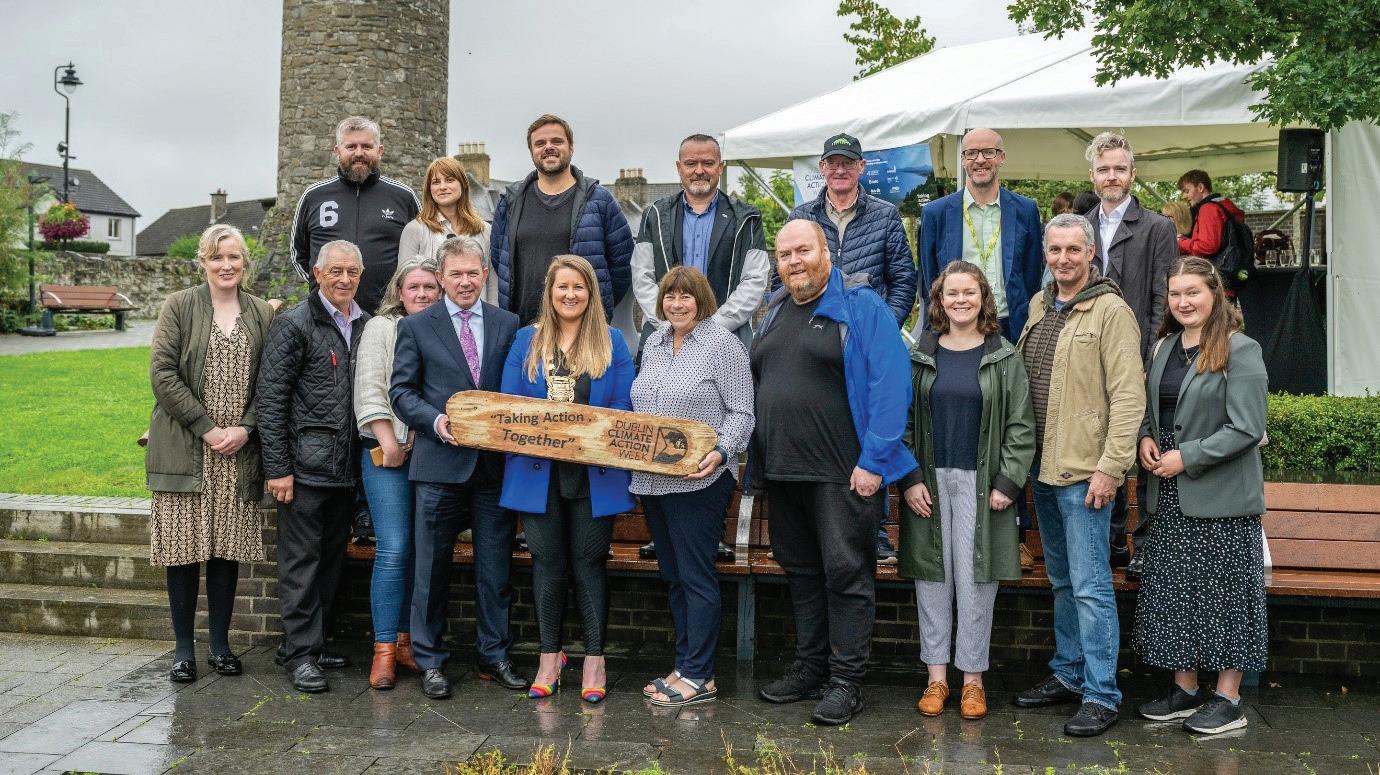
4.4.7 FAST FASHION VIDEO
The impact of fast fashion on the climate is significant. We are making and buying more clothes than the planet can sustain. Between 1996 and 2012 the amount of clothes bought per person in the EU increased by 40%. Each EU citizen consumes approximately 26kg of textiles per year, 11kg of this is discarded to landfill and incineration. Only 1% of textiles worldwide is recycled into new textiles.
Working with the other DLAs, CARO and EMWR, SDCC aim to deliver a 30-40 minute documentary and resource pack reviewing the Irish Fashion Industry and its effect on the environment - mainly focusing on fast fashion, textile waste, waste prevention, microfibers and marine environment, how we care for our clothes care and a call to action.
• Educational resource to enact behavioural change
• Aid the transition to CE (Textiles)
• Improve textile waste and prevention
The target audience for this project will be young consumers of fast fashion. The video is expected to be delivered in 2022/early 2023 and will be available to schools through an online link or directly from the SDCC Climate Action Website.
The overall cost of the project is budgeted at €140,000. SDCC’s Climate Innovation Fund is contributing €25,000 towards this Fast Fashion documentary to highlight the impact of the industry on the climate.
4.4.8 LIBRARIES FAMILY EVENT JUANITA’S TALK WITH CIRCUS 250
SDCC libraries applied to SDCC Climate Innovation Fund for support on a series of interactive talks and workshops aimed at our younger audiences. 7 performances took place across 5 of our library branches (Tallaght, Ballyroan, Lucan, North Clondalkin and Castletymon) between 1st - 3rd November, 2022 during the Season of Science schedule.
You have to listen to Juanita’s Talk – because it’s time we cleaned up our act!
Juanita’s Talk is an hour-long interactive environmental show for the whole family by Ireland’s leading female clown Angelica Santander, looking at recycling in a manner accessible to younger audiences.

The interactive talk looked at questions such as: What should we do with all this plastic? Where does all that plastic we recycle actually go? What can we do to stop it?, and invited the audience to assist in fulfilling her quest for a plastic-free world. Using projections, music, dance and clowning, plastic pollution was tackled in a provocative, entertaining, and ridiculous way. An important, urgent, and utterly hilarious show full of hope for our future.
Juanita’s Talk was followed by a led discussion on positive solutions to plastic pollution.
SDCC Climate innovation Fund supported the libraries family event Juanita’s Talk with €3,630.00.
4.4.9 SMART DUBLIN OPEN DATA CHALLENGE
SDCC partnered with the other 3 Dublin Local Authorities, CARO, CoDEMA, Smart Dublin, Derilinx (open data specialists) and the Department of Public Expenditure and Reform to lead the open data challenge for 2022. The theme for the 2022 Open Data Challenge was a Call to Action to use open data to drive Climate Action. The challenge provided data enthusiasts with an opportunity to examine the broad range of available public open data, identify/define a problem and develop a solution.
Prizes were awarded for the most innovative, engaging and practical solutions
• First Prize €5,000
• Second Prize €3,000
• Third Prize €2,000
37 applications were received by the closing date. 7 projects were shortlisted to progress to stage 2 of the challenge. Members of the steering group provided mentorship to the applicants.
The projects progressed to the final were;
1. GoZeroWaste app
2. Nature Based Solutions zoning map
3. Dublin Cycling Prioritising Analysis
4. iAdapt Game
5. Invasive Species Dashboard
6. My Remote Working Hub
7. Dublin Carbon Calculator

The steering group evaluated the applications and following a showcase presentation on Wednesday 14th September, 2022 as part of Climate Action Week. The winning projects were;
8. My Remote Working Hub
9. Dublin Cycling Prioritisation Analysis
10. iAdapt


